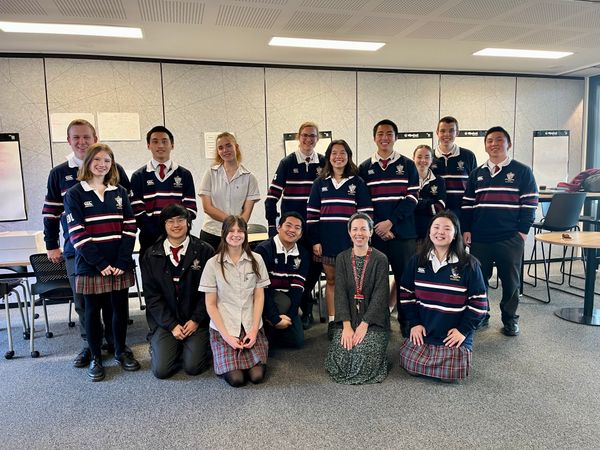Let's hear it for our IBDP students!
Let's hear it for our IBDP students!
By Dr Rebecca Barlow, IBDP Extended Essay Coordinator
Congratulations to our Year 12 International Baccalaureate students who have completed a significant component of their Diploma - the Extended Essay. The Extended Essay is one of three core subjects in the International Baccalaureate, alongside Theory of Knowledge and Creativity, Activity and Service. It is an 18-month independent research project that culminates in a 4000-word paper.
The Extended Essay requires sophisticated skills in crafting literature reviews, research methodologies, conceptual and theoretical frameworks and, oftentimes, conducting primary research. The students have worked extremely hard on their essays and are to be congratulated on completing this significant milestone. Below is a list of the students and their work.
Felix Bian - business management - supervised by Mrs Alison Steven
An analysis of Nvidia’s surge in chip processor sales amid rapid global expansion of Artificial Intelligence (2020–2025).
To what extent has Nvidia’s focus on data centre chip sales between 2020-2025 solidified its leadership in AI hardware, and what risks could threaten its long-term position in the technology sector?
Theo Gould - history - supervised by Mrs Rebecca Hunter
Continuity and change in Oda Nobunaga’s unification of 15th and 16th-century Japan.
To what extent was Oda Nobunaga’s success at creating political stability in 15th and 16th-century Japan carried on by his successors?
Nancy Hang - visual art - supervised by Ms Dimity Kidston
An analysis and evaluation of graffiti’s fight against the discrimination of marginalised peoples.
How have graffiti artists used their art form as protest against state authority in the context of Black Lives Matter (2020), the Macau Property Protests (2010) and the Egyptian Revolution (2011) and how has this influenced how their art is viewed?
Isobel Higgins - biology - supervised by Ms Tracey Craze
The effect of environmental factors on the morphological and biochemical decomposition of Micrococcus luteus colonies over extended post-mortem intervals.
How do environmental factors, including UV exposure and temperature variability, influence the morphological and biochemical decomposition of Micrococcus luteus colonies over extended post-mortem intervals?
Maggie Hill - economics - supervised by Mrs Louise Evans
Dominating the checkout: An analysis of the Coles and Woolworths duopoly.
How does the Coles and Woolworths duopoly affect Australia’s supplier and consumer experience?
Arabella Johnson - economics - supervised by Mrs Louise Evans
The impact of residential land zoning on house and rental prices in the Australian Capital Territory.
How have restrictive land zoning laws contributed to increased house and rental prices in the Australian Capital Territory?
Dexuan Kong - mathematics - supervised by Mr Damien Nemeth
The limitations of Game Theory in explaining the dynamics of international conflicts in the 21st century.
Can Game Theory be adjusted to reflect the changing dynamics of international conflict in the 21st century?
Paige Le Lievre - psychology - supervised by Mr Jack Chalker-Harris
An analysis of the impacts of chronic stress on the human immune system.
How does chronic stress affect the functioning of the immune system, and what are the broader implications for overall health?
Lucas Lin - music - supervised by Mrs Emily Leong
The evolution of jazz fusion drumming.
How have drumming styles, playing techniques, instrumentalization and musical philosophies evolved in Western jazz fusion since its inception in the late 1960s?
Thomas Liu - film - supervised by Mr Tim Minehan
Non-photorealism in computer-generated animation: The creative techniques of Spiderman: Into the Spider-Verse and Puss in Boots: The Last Wish employed to explore the human condition.
How does computer-generated non-photorealistic imagery challenge established conventions of animation to tell creative stories about the human condition?
Sam Nelson - music - supervised by Mrs Emily Leong
What makes music ‘pop’? Determining the techniques behind successful songs using early 20th-century popular music.
How did early 20th-century popular music incorporate different musical techniques to achieve success?
Emma Osborne-Laverty - environmental systems and societies - supervised by Mr Tim Briggs
The future of the Great Barrier Reef: Macroalgae removal as an effective and economically viable strategy for reef restoration.
To what extent is the manual removal of Sargassum an effective and economically viable strategy for mitigating macroalgal overgrowth in the Great Barrier Reef?
Emily Passlow - global politics - supervised by Mrs Alison Steven
Media and political polarisation: The role of the US media in shaping political division domestically and internationally.
How has the media contributed to increasing political polarisation in the US, and to what extent has this compromised its role as a hegemon in international relations?
Jeffrey Pei - literature - supervised by Mr Jason Golding
The cost of utopia: An investigation into authorial voice in Ursula K. Le Guin’s The Ones Who Walk Away from Omelas and Aldous Huxley’s Brave New World
How and to what effect do Ursula K. Le Guin and Aldous Huxley use authorial voice in The Ones Who Walk Away from Omelas and Brave New World to portray the complexity and costs of happiness, and in doing so, criticise the feasibility of achieving a utopian society?
Rea Ramassini - global politics - supervised by Dr Rebecca Barlow
Frozen ambitions: The strategic expansion of China into the Antarctic and the implications for the balance of power in international relations
How is China attempting to extend its geopolitical influence in the Antarctic and what are the implications for the balance of power in international relations?
Miltiades Spyrou - history - supervised by Ms Catherine Gibson
Separating history from myth: An analysis of the historiographical approaches to the Battle of Marathon and its place in preserving Western civilisation and democracy
Have historical sources distorted the significance of the Battle of Marathon (490 BC) and its role in preserving democracy and Western civilisation?
